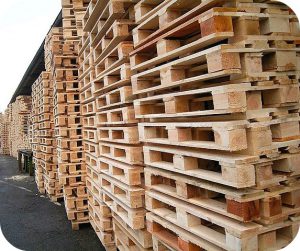 About a century ago, American manufacturers started stacking their goods on wooden pallets that could then be carried off by forklifts. Taking advantage of these two recent inventions allowed factories to transport products in bulk without making a lot of trips. Not much has changed since then: today more than 2 billion pallets circulate around the U.S. carrying everything from car parts to candy.
About a century ago, American manufacturers started stacking their goods on wooden pallets that could then be carried off by forklifts. Taking advantage of these two recent inventions allowed factories to transport products in bulk without making a lot of trips. Not much has changed since then: today more than 2 billion pallets circulate around the U.S. carrying everything from car parts to candy.
Despite its staying power, though, the classic wooden pallet certainly comes with its share of disadvantages. For instance, in 2009 Johnson & Johnson began to receive complaints from customers about a musty smell coming from Tylenol Arthritis Pain caplets. After retracting the problem through its entire supply chain, the company finally identified the culprit as a fungicide that had been applied to thousands of pallets. These wooden platforms traveled with the pill bottles from factory floor to warehouse to retailer, potentially contaminating the entire supply. As a result, Johnson & Johnson halted production and recalled the medication from store shelves, a process that cost the company $900 million.
Fortunately for manufacturers, a new type of smart pallet made by Lightning Technologies in Michigan could change how companies handle logistics. Developed by founder Jeffrey Owens, the pallet is made of wood but covered in a polymer coating that makes it fireproof and easy to clean. Perhaps most importantly, though, each unit comes embedded with a tracking chip that can trace the pallet’s location as well as the weather conditions surrounding it. This could provide logistics managers with unprecedented control over their supply chains. “Today there’s no way to measure how the product is handled or controlled for temperature,” said Bob Spence, a VP at the food company Del Monte. “And God forbid there’s a recall. [With a smart pallet], you have the ability to trace that product quickly and determine what field sold it. Then maybe you don’t have to go back and recall everything.” Although Lightning Technologies isn’t yet equipped for mass production, it has already received $87 million worth of pallet orders.
Questions:
- How could smart pallets potentially change the ways that companies handle logistics?
- After a century of dominance, do you think wooden shipping pallets will soon be replaced by smart pallets on a large scale? Why or why not?
Source: Joann Muller, “This Guy Reinvented The Shipping Pallet, Making It Safer, Stronger And Smarter,” Forbes, May 8, 2018. Photo by Frank Vincentz.
